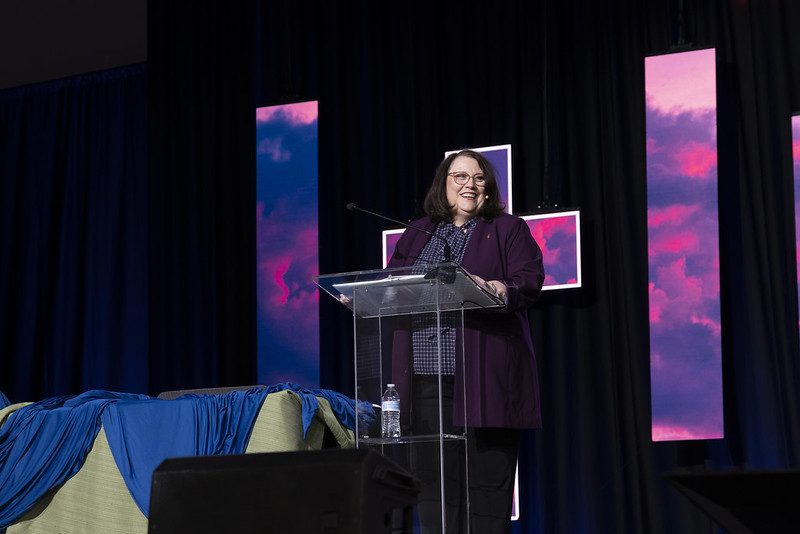
Enough love for all: 2023 Episcopal Address

Bishop Lanette Plambeck delivers the 2023 Episcopal Address to the Dakotas Conference. Photo by jlynn studios.
Bishop Lanette Plambeck's first episcopal address to the Dakotas Annual Conference included a call to remember and a pledge to move forward.
“I don’t have any fancy plans,” she said. “Just a commitment to grow more deeply with God and one another.”
Unfortunately, however, the last several years have seen United Methodists across the country devolve into “throwing words” at one another, much as the disciples were doing on the way to Emmaus, as recorded in Luke’s gospel. The content and tone of this word-throwing has prevented us from recognizing Jesus in our midst.
The gospel story, read aloud by Revs. Sarah Nelson, Rob Samuelson, Karl Kroger, and Laurie Kidd, is a familiar one to Christians. But, according to Bishop Plambeck, we have a tendency to rush too quickly to the revelation of Jesus at the end of the story. She suggested that the time on the road is indispensable to Jesus’ purposes with the disciples.
“They were so focused on the word throwing between themselves that they were unable to recognize Jesus when Jesus showed up. This thing going on between the disciples prevented them from seeing him.”
In keeping with the United Methodist understanding of prevenient grace, Bishop Plambeck noted how the disciples’ failure to recognize Jesus turned out to be an essential part of their transformation. By explaining what had recently happened to Jesus, the disciples were able to turn their focus away from their word-throwing and toward what united them.
Bishop Plambeck hopes United Methodists in the Dakotas will do a similar thing.
“We need to no longer throw words at one another,” she said. “Let’s just shake that off and put it behind us.”
Bishop Plambeck called on the Annual Conference to recall moments when their eyes had been opened to the presence of Jesus among them.
“Look at the landscape of your life,” she said. “When was a time when Emanuel, God with us, showed up to you unexpectedly? That’s to remind yourself that it has happened in the past, and to hold to the promise that it will happen in the future.”
She related her own story of God showing up among a group of friends who encountered a woman she called “Jade” in Lake Junaluska, NC, who was waiting tables and struggling with a host of life issues—domestic violence, mental health crises, separation, and isolation. The group offered her support and promised she would find a home among United Methodists when she was ready.
The name, although a pseudonym, was significant. Bishop Plambeck, pointed out that jade was a stone once used for weapons, but eventually came to signify healing, hope, forgiveness and transformation.
In expressing her hope for the future in the Dakotas, Bishop Plambeck urged members of the annual conference to recognize that there is enough love and grace for everyone to be welcome. She named two new initiatives—the Board of Laity and J.A.D.E (justice, advocacy, development, and education)—to help foster community and send us out in mission to a hurting world.
“We’ve gotten so busy throwing words that our eyes have gotten away from seeing Jesus in our midst,” she said. “So you and I are just going to make the turn. We’re going to make the commitment to love people. We’re going to do this in a Wesleyan way: we’re going to love all the people, all the time, no exceptions. And we are going to work for a just and fair world, the Kingdom on earth as it is in heaven.”